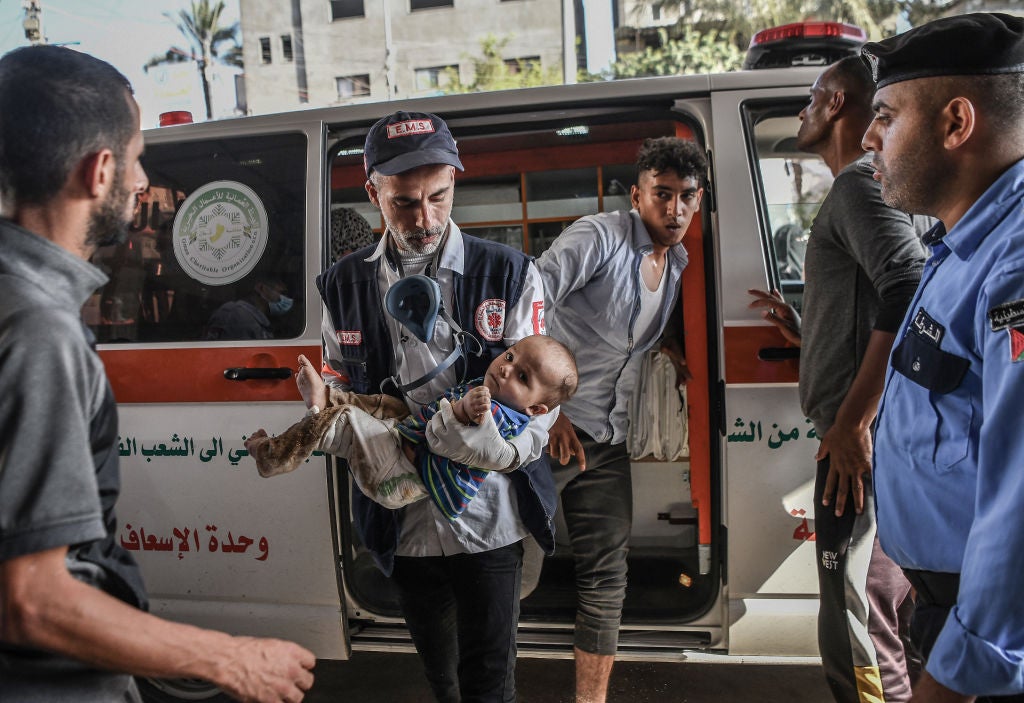Op-Ed: U.S. Media Is Failing The Public On The Crisis In Gaza


The question of who gets to write the first record of history has always been about power and who gets to bear witness. It has been the work of Black and brown cultural workers, writers, journalists and artists that have been crucial to correcting the historical record when perspectives of oppressed people are erased. The current siege of Palestine has shown the hollowness of so-called “objectivity” in media and the encroachment of Palestinian erasure.
For many Americans, these past few weeks may have been the first time they’re thinking about Palestine and Israel. Meaning people are relying on media outlets to help them make sense of what is true, what is happening, and what is to be done.
Although the Israeli occupation of Palestine has been violently unfolding for the past 75 years, most Americans don’t have the clearest sense of the unique role the US and our taxpayer dollars have in sustaining this brutal occupation, year after year, month after month, day after day.
The world has taken notice as the ongoing war crimes committed against Palestinian people by the Israeli military continue despite global calls for a ceasefire. The tirade of airstrikes on the Gaza Strip began on October 7th after Hamas attacked Israelis leading to the death of 1,400 people.
In retaliation, the Israeli government has dropped more than 6,000 bombs on Gaza alone since the beginning of the October 7 assault. Killing over 9,000 Palestinians and over 15,000 injured or missing.
As Americans watch the polemic war crimes being committed in the Middle East, it has led many to question the media’s coverage of the events. Among those questions is how and why there is a lack of diversity in voices and experiences from the conflict, as articles and op-eds have focused primarily on condemning the death of Israeli citizens and the rise of anti-semitism without the proper context about the decades-long strife of Israeli/Palestinian regimes.
Writers such as Derecka Purnell have struggled to see the very publications that have extensively covered critical race theory book bans and free speech wars on campus do the same for the current genocide of Palestinians.
Saying to ESSENCE after speaking out about the lack of coverage in the media, “Black women writers on the left experience a ‘triple standard’- because how dare we have an opinion about an occupation in the Middle East.”
As of October 18th, Shlomo Karhi, Israel’s communications minister passed regulations to ban Al Jazeera, the Qatar-based news broadcaster from any physical presence or being able to report in Gaza or Israel on the basis of reporting on the conditions of Palestinians, as the Israeli military continues to bomb and receive more military aid from the US.
The Committee to Protect Journalists Middle East and North Africa program coordinator, Sherif Mansour, said in a statement, “We are deeply concerned by Israeli officials’ threats to censor media coverage of the ongoing Israel-Gaza conflict, using vague accusations of harming national morale.”
The social media reaction to this moment has led many to critique legacy media’s ethical codes, as harmful misinformation about massacred children have circulated all the way up to the White House and spoken by the president.
White House representatives have since not been able to fully recant Biden’s statements about seeing images of beheaded Israel children, and they simply deflect to the confirmation by the Israeli military. However, the journalist who reported the story has since said she has no evidence to back up her claim.
Palestinians on the ground in Gaza have also been crucial. They have shown first hand accounts of the siege unconstrained by western media. More than that, Palestinians are able to address the 16-year blockade enforced by Israel’s government in which Palestinians have no control over their food, electricity, wifi, water and cannot move about the country freely without Israeli government approval.
This blockade which began in 2007, and the current bombing of the Gaza Strip advances a long-standing legacy of collective punishment that the UN and various humanitarian organizations have called them war crimes for decades.
However, in the midst of an onslaught of media that has left readers with more questions than answers, journalists like Marc Lamont Hill have called the media to task for their role in the frenzy.
Notably, Hill interviewed Former Israeli Prime Minister, Danny Ayalon in a clip that has since gone viral. When asked about the responsibility media workers have at this moment, Hill told ESSENCE, “I’d say our first responsibility is an intellectual responsibility. We have to study the issue, we have to know the issue, we have to know basic history and facts. We have an ethical and professional responsibility as journalists to ask tough questions to people in power. We can’t just ask tough questions when it’s convenient. We have to do it when it’s difficult, especially when it’s difficult.” Hill names Glen Ford, of the Black Agenda Report as a direct predecessor to Hill’s own legacy of media accountability and fortitude in how Ford held power to account in every corner of his career.
There have been more than a few viral moments on live television where spokespeople and protesters have been able to openly critique the media’s unequal coverage. Namely, CNN reporter Sara Sidner being confronted by Palestinian protesters in the Ramallah area of the West Bank. Most recently, a protester at the Rafah border crossing in Gaza confronted Clarissa Ward of CNN about the narrative erasure of Palestinian people and its emboldening of islamophobia in the wake of the bombing of the Gaza Strip. Each of these moments depict corporate media being held to account for the ongoing hyperfixation on Hamas and not the decades long blockade on the people of Gaza City since 2007.
The history of media’s ability to manufacture consent begins at the beginning of media’s conception and is often the core of why resistance movements historically have been labeled as threats to the state or have had to create their own forms of media to get the reality of the lived experiences as media falls behind.
We’ve seen this with the Black Panther Party’s newspaper, The Young Lords Party and how current youth lead movements are using social media to hold politicians accountable to their contributions to the climate crisis.
“Throughout history, we’ve seen the media do considerable harm by the way it tells stories and by the way it does not tell stories. When you cover a story, you are establishing its value. When you cover a community, you’re asserting the extent to which they matter,” said Hill on why the lack of dynamic coverage on Palestine and Israel follows a long legacy of media harm for Black and brown communities.
Western media, mostly owned by conglomerates and a small group of elites, has structural issues when it comes to accountability, transparency, and democracy of information. The legacy of media harm goes beyond stereotypes and tropes, but extends its tentacles to most recently incorrectly reporting on the bombing of a hospital in Gaza, justifying war, assassinations, and even genocide.
In 1967, the NYT published an article titled Armed Negroes Protest Gun Bill labeling the Black Panther Party as an “anti white party.” Two years later, a key leader of the Black Panther Party, Fred Hampton, 21 years old, was assassinated in a collusion between the FBI and the Chicago Police Department.
In 2004, the NYT published a note titled “The Times and Iraq,” where they admittedly reflect on their failure of upholding journalistic standards during their coverage of the US invasion of Iraq, finding that there were”a number of instances of coverage that was not as rigorous as it should have been.”
This lack of rigor enables violent consequences: between 550,000-580,000 people have been killed in Iraq and Syria since the United States’ 2003 invasion.
In 2021, over 500 American journalists signed on to an open letter to their media peers, agitating them to honor journalistic standards when covering Israel and Palestine, rather than sanitizing Israel’s war crimes.
There are thankfully independent journalists, Black media ecosystems and non-western news outlets that have been able to broaden the global understanding of what’s happening in Israel and Palestine. It requires what many social media sites actively work against: being intentional with media consumption, taking time and researching global moments of crisis to best assess news. Hill suggests reading news outlets and publications like The Amsterdam News, The Black Agenda Report and Al-Jazeera to learn more about international issues.
“We should not just be consuming the Western corporate media. We should be reading western independent media and western radical media outlets along with media from the global south,” Hill says.
He adds, “we need to develop a critical media literacy” in moments where our media is failing us time and time again.
This moment asks media workers and journalists across the globe to take seriously what it means to enable the culpability of harm as our work builds out narratives and meaning for marginalized peoples’ direct lived experiences. That is the work. We must take it seriously or be haunted by our failings.
Source link : www.essence.com
























































